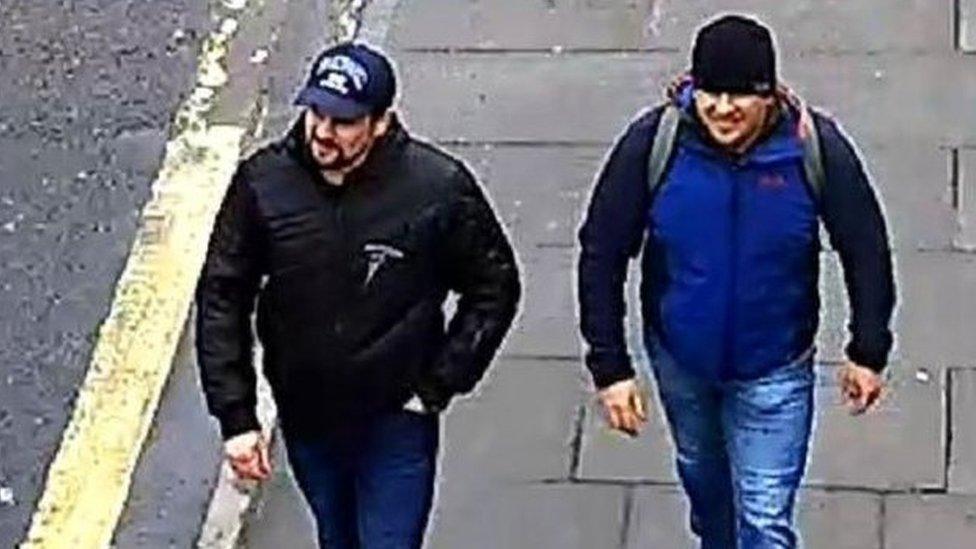Skripal poisoning: Putin denounces ex-spy as 'scumbag'
- Published
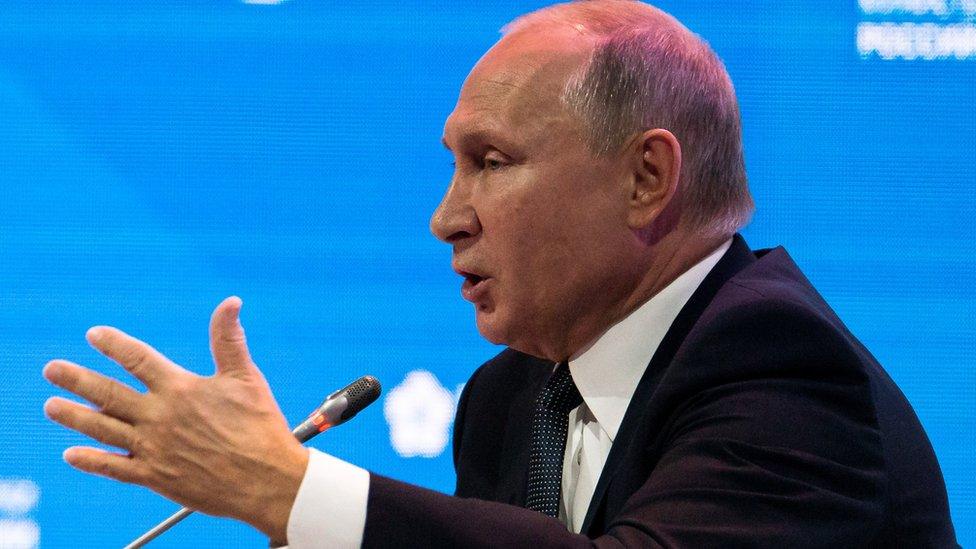
President Putin has maintained the suspects in the poisoning of Sergei Skripal are civilians
Russian President Vladimir Putin has labelled poisoned ex-Russian spy Sergei Skripal a "traitor" and a "scumbag".
In a speech, he complained that the media were treating Mr Skripal as "some kind of human rights defender", insisting he had betrayed his country.
Mr Skripal and his daughter survived an attack in Salisbury, which the UK says was carried out by two agents of Russian military intelligence.
But a British woman died in another poisoning that police say was linked.
UK authorities believe Mr Skripal's door in the southern English city was targeted with the nerve agent Novichok.
It was sprayed from a modified perfume bottle that was later picked up and given to Dawn Sturgess, who died in July, they say.
Last month, President Putin insisted that the suspects named by UK police were civilians not criminals, and urged them to come forward. They later gave a televised interview.
He said on Wednesday that he thought the whole "information campaign" surrounding the former Russian spy had been "blown up" and that it would pass, "the sooner, the better".
Who is Sergei Skripal?
Mr Skripal is a former Russian intelligence officer, who was arrested in 2004 and put on trial for "high treason in the form of espionage" by a Moscow military court.
Authorities accused him of being a double-agent who shared Russian state secrets with Britain's MI6.
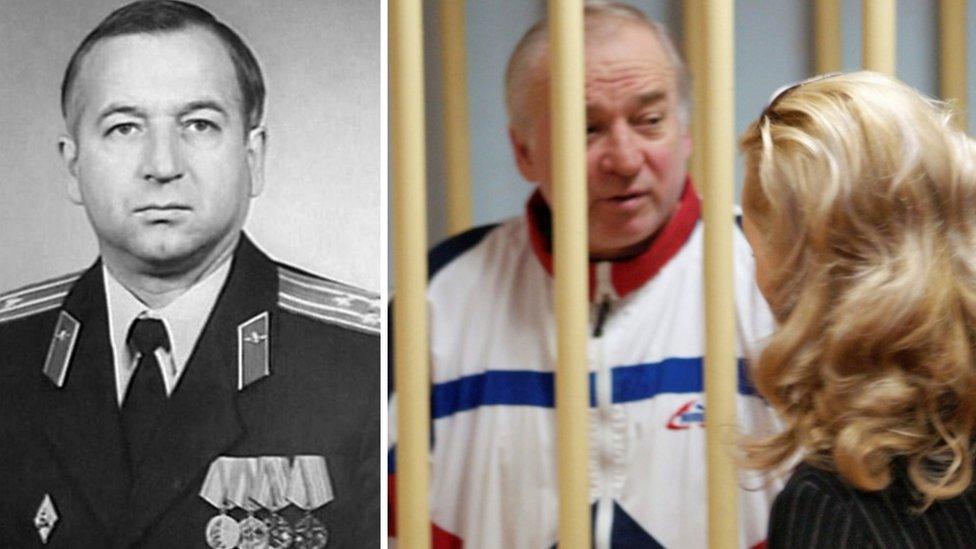
Mr Skripal has lived in the UK since being released in a prisoner swap
He confessed and co-operated at trial and was then jailed for 13 years, but was pardoned in 2010 then released to the UK as part of a prisoner exchange.
"I see that some of our colleagues are pushing the theory that Mr Skripal was almost some kind of human rights activist," Mr Putin said on Wednesday.
The Russian leader, a former intelligence officer himself, then described Mr Skripal as a "traitor to the motherland".
"He's simply a scumbag, that's all."

Putin goes on the attack
By Sarah Rainsford, BBC Moscow correspondent
The verbal attack on Sergei Skripal underlines Vladimir Putin's personal hatred of betrayal. He's said before it's the one thing he can't forgive.
Many Russians share that contempt, and there was applause from some in the conference hall for the comments. But Mr Putin's outburst also seems meant to distract from increasing talk about the two key suspects in the poisoning.
Last month, at another conference, he was asked about the men. He vouched for them personally, saying there was "nothing special" and "nothing criminal" about them.
Crucially, he also insisted they were civilians. Since then, credible evidence has emerged that the men are in fact military intelligence officers and investigative journalists are still digging. On that, Vladimir Putin has so far remained silent.

Who poisoned Mr Skripal?
The UK says two Russian nationals who travelled under the names of Alexander Petrov and Ruslan Boshirov tried to kill the ex-spy and his daughter Yulia.
The two suspects gave a televised interview in Russia in which they claimed to be "just tourists" visiting the city of Salisbury because of their interest in its 123m (400ft) spire.
However, their story was widely mocked in Russia as well as the UK, and one of the men was subsequently identified by an investigative website as Colonel Anatoliy Chepiga, an officer in Russia's GRU military intelligence.
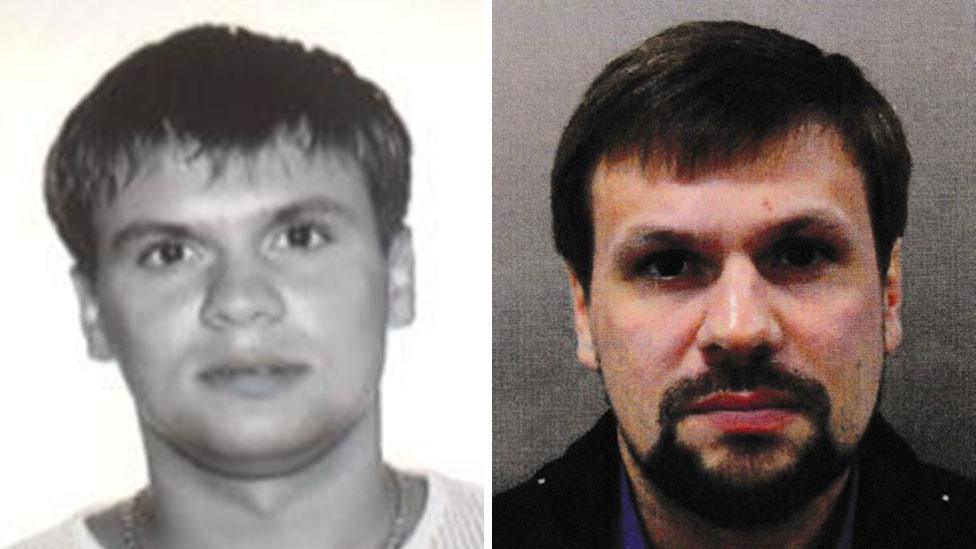
The Bellingcat website released a photo of the man it says is Anatoliy Chepiga (left), while Russia Today named him as Ruslan Boshirov (right)
The website, Bellingcat, said Col Chepiga had been made "Hero of the Russian Federation" by President Putin himself in 2014.
Speaking to the BBC, a woman in the town where Chepiga grew up then then identified the Salisbury suspect as the intelligence officer.
On Wednesday Mr Putin dismissed the allegation that Russia was responsible for Ms Sturgess's death.
"Sometimes I'm amazed by what's going on around this case: so some guys came to Great Britain and started poisoning homeless people? What nonsense!" he said.

What Putin has said before
BBC Monitoring
About a fortnight after the poisoning, President Putin said any suggestions of Russian involvement were "total nonsense", and called it "unthinkable that anyone in Russia would do such a thing ahead of the presidential election and the Fifa World Cup".
In May, Mr Putin denied that Mr Skripal was poisoned with a military-grade nerve agent, saying he would have died "on the scene" if that was the case. "A military toxic agent is so powerful that it kills a person instantaneously," the president added.
He went on to deny that Russia had any chemical agents: "We have destroyed all our chemical weapons."
After Sergei Skripal was discharged from hospital later in May, Mr Putin sounded delighted.
"God bless his health, we're very glad about this," the president told a news conference with German Chancellor Angela Merkel. "Thank God he's recovered… and I hope he'll be healthy."
- Published29 September 2018
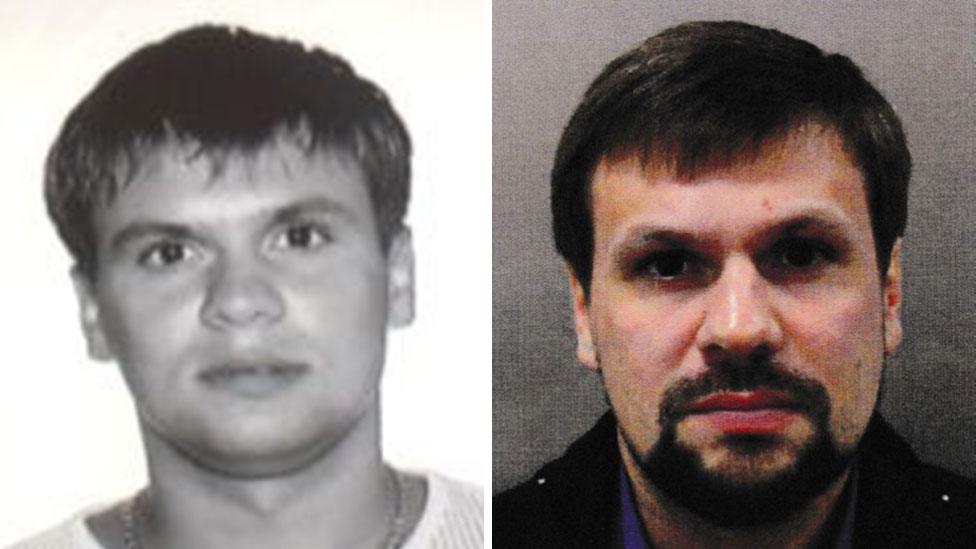
- Published12 September 2018
